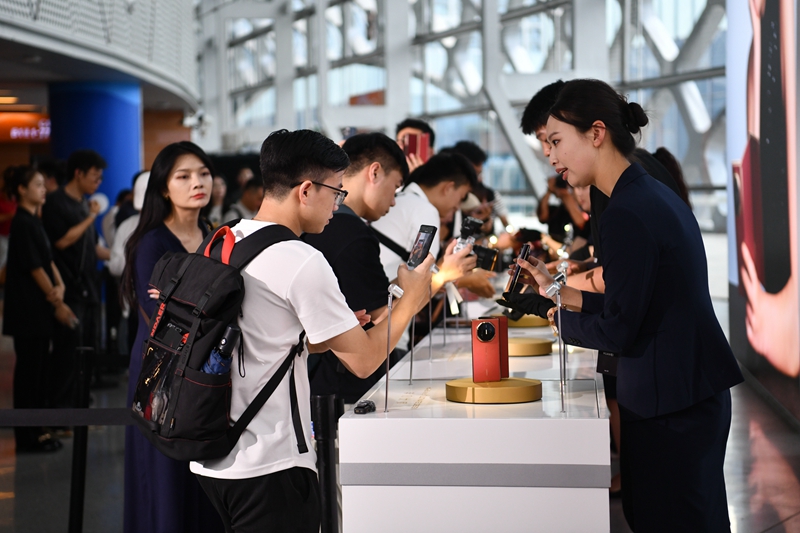Recently, Giolitti made its much-anticipated debut in China.
The brand's first store in China opened in Shanghai during the 2025 Chinese New Year holiday, from January 28 to February 4. Its operator, an Italian with the Chinese name Zhao Dan, said the company had noticed many of its customers in Rome were Chinese tourists, which inspired its China entry. The Shanghai opening instantly became a social media sensation. Seeing the buzz firsthand, Zhao revealed plans to open more stores across China.
Across the ocean, Chinese bubble tea brand HEYTEA opened its first overseas LAB store in Times Square, New York, this February. The LAB store is HEYTEA's highest-end flagship, and the opening day saw long lines of customers. Since entering the U.S. market in 2023, HEYTEA has already opened over 20 stores across the country. It has also been investing heavily in enhancing local supply chain capacity, including building warehouses and providing logistics services.
These new stores are typical examples of what is driving China's rapidly growing debut economy. From multinationals to homegrown brands, from major cities to lower-tier markets, and from domestic success to international expansion, the concept of "firsts" has become a new benchmark for both brand and city competitiveness.
As this wave of firsts sweeps across the economy, it raises the questions: How is this reshaping the consumer landscape? And how does it evolve from a "traffic frenzy" to a sustainable growth driver?
Power of the 'first'
The concept of the debut economy originates from the concept of the first-store economy, which refers to the inauguration of a brand's first store in a new market.
In 1930, the world's first modern supermarket opened in New York City, introducing a new sales model where larger purchases earned bigger discounts—a concept that matched the rise of car ownership in the U.S. and people's ability to purchase large quantities of goods at once.
Key first-store milestones in the Chinese mainland include the first self-service supermarket in Guangzhou, Guangdong Province, in 1981, the first KFC restaurant in Beijing in 1987 and the first 4S (sales, service, spare parts and surveys) car dealership in Chongqing in 1996.
These landmark store openings weren't just commercial successes. They represented major social shifts and changes in consumer behavior, leaving a lasting impact on the evolution of global commerce, Deng Zhou, a researcher with the Institute of Industrial Economics of the Chinese Academy of Social Sciences, told Beijing Review.
However, the debut economy is not merely an extension of the first-store economy. Li Gang, Director General of the Department of Market Operation and Consumption Promotion of the Ministry of Commerce, said at a press conference in 2024 that the debut economy refers to the first-time launch of state-of-the-art products, business models, services or technologies by a company.
Deng said the concept of "debut" is expanding, with a variety of forms emerging, such as first stores, first exhibitions and first performances. These debut activities are gradually forming an industry chain and economic ecosystem.
"Although the debut economy primarily consists of commercial activities by market entities, its impact extends far beyond individual businesses," Deng explained. "It has had a profound influence on technological advancements, brand development, consumer growth, regional economic vitality and the enhancement of commercial competitiveness."
Take hit Chinese video game Black Myth: Wukong, which was first released in August 2024, as an example. Its launch has not only promoted Chinese culture globally but also stimulated the growth of related industries, such as the cultural and tourism sector in Shanxi Province where a lot of the temples featured in the game are located. This highlights the dual impact on both local economies and cultural development.
In 2024, both the Third Plenary Session of the 20th Communist Party of China Central Committee and the Central Economic Work Conference, which set the tone for the Chinese economy in 2025, underscored the importance of the debut economy, signaling the national priority placed on using debut economy activities as a catalyst for economic expansion.
According to a report released by the China Center for Information Industry Development, in 2024, Shanghai and Beijing added 1,269 and 960 debut stores, respectively. Since 2021, Shanghai has introduced over 4,000 first stores, while Beijing has created 12 global debut hubs, including locations like Sanlitun Taikoo Li and China World Mall.
This year, many local governments prioritize the debut economy in their annual plans. For instance, Jilin Province has announced a goal to introduce and cultivate 100 debut stores in 2025.

Attendees try out Huawei's first smartphone with a triple-folding screen at its product launch in Shenzhen, Guangdong Province, on September 10, 2024 (XINHUA)
Beyond the buzz
"The essence of the debut economy lies in the competition for consumer attention," Wang Yong, Director of the Digital Economy Research Center at Tsinghua University, told news website Zhonghongwang.com.
He identified two major challenges in developing the debut economy. The first is that consumer attention has largely shifted online, leaving many brick-and-mortar retailing outlets with low foot traffic. Redirecting online attention to physical stores is a difficult task. The second challenge is how to translate the spending spree triggered by debut events and first stores into sustainable business growth.
"We should amplify the long-term effects of debut activities and first stores," Zhu Min, Director of the Shanghai Municipal Commission of Commerce, said. He emphasized the need to strengthen a chain development mindset, improving brand adaptability, market visibility and service convenience.
Wang suggested small and medium-sized enterprises with limited brand recognition leverage the debut economy to better promote their products and services. He also called on local governments to cultivate industries with unique regional characteristics, using debut events to drive their development.
He said local governments can leverage public platforms and underutilized public resources, such as large cultural and sports centers or exhibition halls, to reduce the costs for individual stores or businesses to engage in debut economy activities.
Xu Xiaoliang, Executive Director and Co-CEO of Shanghai-based investment firm Fosun International, said attention must be given to the quality of debut events and first stores, elevating their impact to better meet personalized consumer demand. BR
(Print Edition: From Trend to Transformation)



















